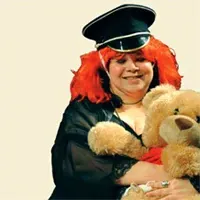Recorded Delivery
Written by

By James Hadley in London
Alecky Blythe's company Recorded Delivery have made a name for themself through bringing a new verbatim theatre technique to prominence. The actual recordings of real people speaking are played in the actors' ears via headphones and the actors echo the voices seconds later, repeating every little idiosyncratic speech pattern.
It's a technique that's quickly been widely adopted in London, and although I hadn't heard of it before arriving, I've since seen it used in several new writing and student performance showcases. But it was only recently that I experienced a full production using the technique. It was a revival of Alecky Blythe's play 'The Girlfriend Experience', which premiered last year at the Royal Court Theatre but is now to be seen at the Young Vic Theatre.
The play is constructed from recordings of four female sex workers talking about their work and lives in between the visits of clients to the Bournemouth apartment where they operate. At the beginning of the performance, as actors synchronise their headphones with the onstage sound technician, we can hear the voices and see the actors echoing them. Quickly the voices are faded out, and our awareness of the headphones quickly fades away too. What results is a gritty authenticity, a documentary accuracy due to the exact imitation of the recorded voices. It seems all too close to reality TV in tone much of the time.
We're gradually made familiar with the different approaches of the characters' to their jobs, and you can sense the curiosity of much of the audience, finding themselves in foreign territory. Of course, these women are completely matter-of-fact about sex - it's just what they do. Laughter emerges largely due to audience members' hang ups, although there were certainly shared moments of revulsion around some clients' requests. Ingeniously, there is a cutaway feature within the set which allows us to see the approaching clients' from the knee down only - as if looking out onto the street through the top of a basement flat's window. Just one actor plays all of the clients within the production, chameleon-like, transforming from a dodgy heavy-handed, heavy-breather to a doddery octogenarian who wants to be spanked by leather-gloved hands.
With any verbatim script, much of the writing is in the editing, and the material has been cleverly shaped so that we do build a sense of character journey for most of the characters. Suzy's father dies, and her boyfriend turns out to be another of those clients trying to get it for free. Tessa has something of a mid-life crisis, questioning how she ended up doing what she's doing and that being 'it', but then finds love and hope in the future again. Then there's the young girl, who's on drugs most of the time, cigarette burns evident on her arms, and whose defining moment is successfully timing her intake of liquids to fulfill a client's request for water sports.
You certainly get the picture that the editing has not been a process of censoring, nor has it shaped the material in such a way as to comment on the characters' choices. They're left to speak for themselves. Instead, the editing subtly shapes the material into something remarkably close to a traditional play, with all its crises and character developments.
There are plenty of umms and aahhs, such that you're never in any doubt that you're listening to real voices. It's one of those things you can't quite put your finger on, but a real way of speaking is just different to scripted speech somehow, and that's what gives the whole experience that grubbiness of reality TV. Along with the colourfulness of the language. You really do feel like you're a fly on the wall, except that most of the characters are talking in direct address to the audience for much of the time - we're placed like a stand-in for the playwright (presumably) as interviewer. Just as the real women spoke candidly of their lives to Alecky Blythe, in between re-doing their makeup and answering the phone when prospective clients call, now the actors speak to us, giving us a whole range of insights into the realities of sex work.
The strengths of the piece are in its refusal to pass judgement, in its acceptance of the humanity of all the individuals in the situation portrayed, and this documentary-like stance is surely tied to the mode of recorded delivery driving proceedings.